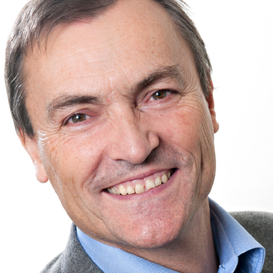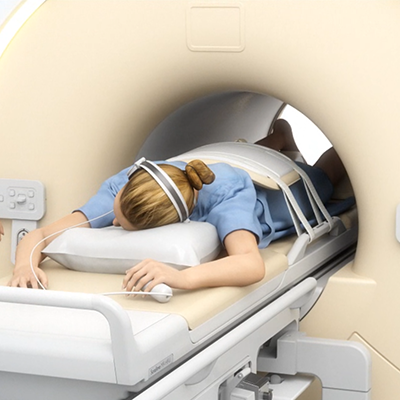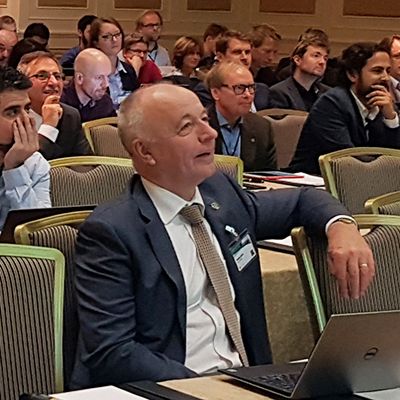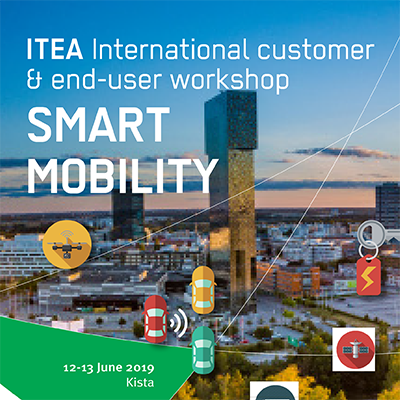Focus on Sweden
An innovative force in a sustainable world!
As Sweden’s government agency for innovation, Vinnova funds innovation projects and the research needed to develop new solutions as well as invests long term in strong research and innovation environments. Its aim is to make Sweden an innovative force in a sustainable world, a leading global player in research and innovation and a country that is attractive for investment and entrepreneurship. Investments in research, development and innovation are paramount to economic growth, job creation and solving grand societal challenges. Among these spearheads, a focus on strengthening international cooperation is key.
Andreas Allström works as a programme manager at the Vinnova department for Industrial Technologies, focusing on information and communication technologies and software innovation. He is involved in both international programmes (ITEA 3 and ECSEL JU) and national ICT and automotive programmes, so he’s a good person to bring us up to date on the state of play in Sweden at the moment.
Software is taking over
Andreas refers to the 2015 publication ‘Small and beautiful - The ICT success of Finland & Sweden’ aimed to provide understanding of the mechanisms that have taken Sweden (and Finland) to leading positions in ICT and digitalisation. “Although we are almost 4 years down the road,” Andreas says, “the findings of this study are still valid and valuable today. Learning the lessons contained in the study is key to the ongoing improvement of Vinnova’s strategies and activities.” In Sweden the ICT sector plays a predominant role as a source for economic growth, as a key employer and as a provider for solutions to societal challenges. “Many companies consider themselves software companies,” Andreas remarks, “even those the consumer might think of as hardware producers like car or aircraft manufacturers. This really underlines how the lines between software and hardware are becoming blurred as the latter becomes increasingly dependent on the former. I mean, you just have to look at the car, truck, aerospace, robotics and other ‘hardware’ producers and the increasing heterogeneity in their product range – various versions of the same model – and you realise that production is really being controlled and managed – even shaped – by software.” Backing up this claim, a recent statistical survey in 2018, performed by Statistics Sweden (SCB) on behalf of Swedsoft, investigated the importance of software development for all Swedish industry segments, and all company sizes from four employees and up. A brief excerpt of the results shows that:
- 35% of all companies develop software in house
- 45% of all companies are hindered in growth because they cannot hire software developers (which could indicate that more companies would develop software in-house if they were able to hire competence)
- 100% state a dependence on software for their business model.
Disruptions - the ups and downs
Since the turn of the millennium global developments within the ICT sector, in particular the advent of cloud computing, big data and mobile internet as well as the convergence of previously distinguishable ICT sub-sectors, amounted to something that can justly be called the ‘second disruption’. The first disruption was the arrival of GSM that enabled Sweden to break into the global scene as a major provider of ICT. This second disruption hit Sweden hard, and counting on winning large network equipment delivery contracts from telecommunications operators worldwide, the market went into recession. Ericsson slumped and by 2004, Ericsson’s global and Swedish employment had more than halved on their previous levels. The ICT sector outside Ericsson was hit even harder as tens of thousands workers in ICT-related development, consulting, maintenance and research suffered the knock-on effects.
Swedish companies really benefit from being involved in ITEA projects and, by association therefore, Swedish industry also reaps the rewards.
Dynamics, resilience and innovation
“But there was also a positive flipside,” Andreas recalls. “Swedish expertise in technologies underlying the second disruption triggered an intensive period of start-up activity in internet services and software, and successful repositioning in what was still, despite the economic bubble bursting again, a vibrant global market. Sweden had the dynamics, resilience and innovation to respond and overcome adversity. In Sweden, according to the 2015 study, the ICT sector accounts for 5-6% of GDP and 3-4% of total working hours. Software and services is the biggest ICT sub-sector, with ICT consulting, which accounts for about a quarter of all ICT employment. It’s a pretty diverse and dynamic sector and one in which Vinnova invests a substantial portion of its SEK 3 billion budget each year to foster innovation related to digitalisation. Most of these funds are allocated via Calls for proposals in which companies, academia, public sector actors and other organisations apply for funding. We try to constantly monitor and evaluate all the investments and regularly analyse the impacts of our investments.”
Learning lessons well
The ICT sector in Sweden is a rapidly growing sector of the Swedish economy with a high concentration in and around Stockholm. The landscape is dominated by software and service companies with less than a quarter of employees employed in a hardware company (Ericsson still occupying a very dominant position). As mentioned already, the ICT sector is characterised by great dynamics, and many companies have been acquired by domestic or foreign corporations, in part due to Sweden's international reputation as a highly ICT productive environment and Stockholm's position as a major hotspot for ICT. Despite the ICT sector and ICT development in general flourishing, Sweden faces a shortage of programmers, system developers, etc. "but," as Andreas points out, "we are good at learning lessons and in terms of competence, there are plenty of role models to lean on: companies who have already been down the same roads and can give guidance."
Challenge of AI
Digitalisation and Artificial Intelligence are 'hot' topics, that's undeniable, and Swedish society is characterised by a high degree of digitalisation compared to most other countries. IT infrastructure is well developed and has a high capacity in large parts of the country. Digitisation in working life has come a long way in many sectors, while a majority of the population is connected to the internet and has a high level of IT experiences. This is evident from another study commissioned by Vinnova and published last year to investigate the development to date of Sweden's use of AI along with the AI skills needed for business and public services. "AI competence will be crucial to realising our AI capability," Andreas explains. "While computer science skills are important, successful AI development often requires extensive software development. So access to AI competence will be a significant challenge. With AI applications expected to increase drastically in the next few decades since, there will also be a sharp rise in global demand for AI competence, so it will be a challenge we will have to address. Dynamics, resilience and innovation – we’ve shown we are capable!"
Value of EUREKA Cluster programmes
That EUREKA in general, and ITEA in particular, are valuable vehicles to enabling Sweden to implement its ICT strategies can be seen in the growing commitment by Sweden in ITEA, with participation over recent years having been increased substantially. Sweden was sixth in terms of effort per country of the ITEA 3 Call 5 FPP submission of 14 February 2019. “Since 2016 we have increased our budget for EUREKA Clusters by 150% and in 2019 the budget is €10 million”, Andreas says. “From Vinnova’s point of view, EUREKA and the clusters are vital to our internationalisation strategy, and they provide the industry with a trusted framework for international collaboration for innovation and standardisation efforts.” The Swedish Public Authorities and ITEA have demonstrated how serious they are about promoting this growth, hosting several events in the past few years like the EUREKA Innovation Week, the pre-PO Days event and the ITEA Digital Transition masterclass, the SSF – Vinnova conference on Software for Competitiveness and the ITEA Project Outline Days, the annual brokerage event, to facilitate even more Swedish participation in the upcoming ITEA Call. With Saab now bolstering the Swedish ‘voice’ on the ITEA Board, the statement of intent is loud and clear. “Swedish companies really benefit from being involved in ITEA projects and, by association therefore, Swedish industry also reaps the rewards. It’s not an easy task to quantify the impact but from our dialogue with industry, it is very clear that they rate these projects very highly, and their continued – even increasing – participation proves that.”
More information
https://www.vinnova.se/Other chapters
Use the arrows to view more chapters

Editorial
By Philippe Letellier

Country focus: Sweden
An innovation force in a sustainable world!

Country focus: Sweden - Saab AB
Commitment to trustworthy software innovation

SoRTS Success story
A system of real-time systems for more effective healthcare

SotA BaaS
Semantic technologies and very traditional industry as Building

Community Talk with Fopke Klok
The Klok is ticking ... on life at ITEA ... and beyond

End user happiness FUSE-IT
Security of Smart Buildings: saving energy and lives!

Metaverse1 Success Story
The missing link between the real and the virtual

Customer workshop Smart Mobility
Help solve the challenges resulting from this ITEA customer workshop

SME spotlight IKANGAI
Your partner for mobile customer engagement

ITEA 3 Call 5 projects
Happiness, openness and trust

